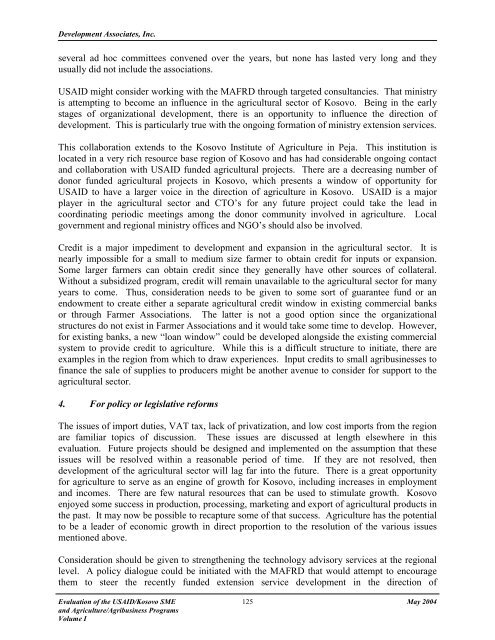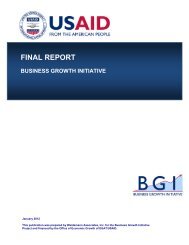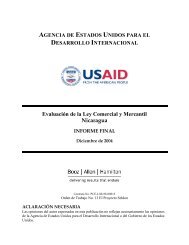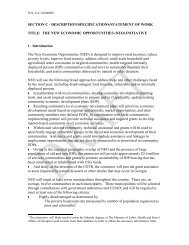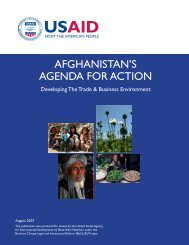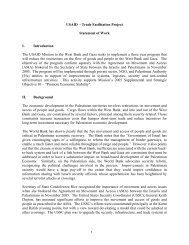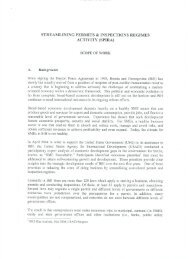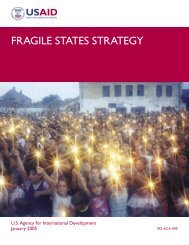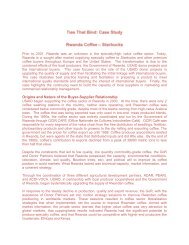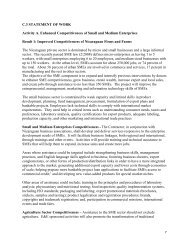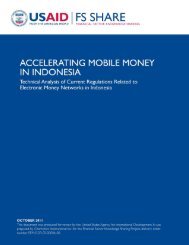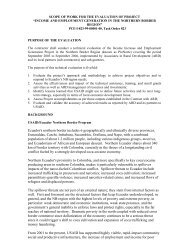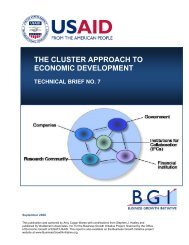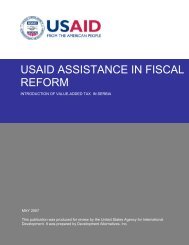Evaluation of the USAID-Kosovo SME and Agriculture - Economic ...
Evaluation of the USAID-Kosovo SME and Agriculture - Economic ...
Evaluation of the USAID-Kosovo SME and Agriculture - Economic ...
You also want an ePaper? Increase the reach of your titles
YUMPU automatically turns print PDFs into web optimized ePapers that Google loves.
Development Associates, Inc.several ad hoc committees convened over <strong>the</strong> years, but none has lasted very long <strong>and</strong> <strong>the</strong>yusually did not include <strong>the</strong> associations.<strong>USAID</strong> might consider working with <strong>the</strong> MAFRD through targeted consultancies. That ministryis attempting to become an influence in <strong>the</strong> agricultural sector <strong>of</strong> <strong>Kosovo</strong>. Being in <strong>the</strong> earlystages <strong>of</strong> organizational development, <strong>the</strong>re is an opportunity to influence <strong>the</strong> direction <strong>of</strong>development. This is particularly true with <strong>the</strong> ongoing formation <strong>of</strong> ministry extension services.This collaboration extends to <strong>the</strong> <strong>Kosovo</strong> Institute <strong>of</strong> <strong>Agriculture</strong> in Peja. This institution islocated in a very rich resource base region <strong>of</strong> <strong>Kosovo</strong> <strong>and</strong> has had considerable ongoing contact<strong>and</strong> collaboration with <strong>USAID</strong> funded agricultural projects. There are a decreasing number <strong>of</strong>donor funded agricultural projects in <strong>Kosovo</strong>, which presents a window <strong>of</strong> opportunity for<strong>USAID</strong> to have a larger voice in <strong>the</strong> direction <strong>of</strong> agriculture in <strong>Kosovo</strong>. <strong>USAID</strong> is a majorplayer in <strong>the</strong> agricultural sector <strong>and</strong> CTO’s for any future project could take <strong>the</strong> lead incoordinating periodic meetings among <strong>the</strong> donor community involved in agriculture. Localgovernment <strong>and</strong> regional ministry <strong>of</strong>fices <strong>and</strong> NGO’s should also be involved.Credit is a major impediment to development <strong>and</strong> expansion in <strong>the</strong> agricultural sector. It isnearly impossible for a small to medium size farmer to obtain credit for inputs or expansion.Some larger farmers can obtain credit since <strong>the</strong>y generally have o<strong>the</strong>r sources <strong>of</strong> collateral.Without a subsidized program, credit will remain unavailable to <strong>the</strong> agricultural sector for manyyears to come. Thus, consideration needs to be given to some sort <strong>of</strong> guarantee fund or anendowment to create ei<strong>the</strong>r a separate agricultural credit window in existing commercial banksor through Farmer Associations. The latter is not a good option since <strong>the</strong> organizationalstructures do not exist in Farmer Associations <strong>and</strong> it would take some time to develop. However,for existing banks, a new “loan window” could be developed alongside <strong>the</strong> existing commercialsystem to provide credit to agriculture. While this is a difficult structure to initiate, <strong>the</strong>re areexamples in <strong>the</strong> region from which to draw experiences. Input credits to small agribusinesses t<strong>of</strong>inance <strong>the</strong> sale <strong>of</strong> supplies to producers might be ano<strong>the</strong>r avenue to consider for support to <strong>the</strong>agricultural sector.4. For policy or legislative reformsThe issues <strong>of</strong> import duties, VAT tax, lack <strong>of</strong> privatization, <strong>and</strong> low cost imports from <strong>the</strong> regionare familiar topics <strong>of</strong> discussion. These issues are discussed at length elsewhere in thisevaluation. Future projects should be designed <strong>and</strong> implemented on <strong>the</strong> assumption that <strong>the</strong>seissues will be resolved within a reasonable period <strong>of</strong> time. If <strong>the</strong>y are not resolved, <strong>the</strong>ndevelopment <strong>of</strong> <strong>the</strong> agricultural sector will lag far into <strong>the</strong> future. There is a great opportunityfor agriculture to serve as an engine <strong>of</strong> growth for <strong>Kosovo</strong>, including increases in employment<strong>and</strong> incomes. There are few natural resources that can be used to stimulate growth. <strong>Kosovo</strong>enjoyed some success in production, processing, marketing <strong>and</strong> export <strong>of</strong> agricultural products in<strong>the</strong> past. It may now be possible to recapture some <strong>of</strong> that success. <strong>Agriculture</strong> has <strong>the</strong> potentialto be a leader <strong>of</strong> economic growth in direct proportion to <strong>the</strong> resolution <strong>of</strong> <strong>the</strong> various issuesmentioned above.Consideration should be given to streng<strong>the</strong>ning <strong>the</strong> technology advisory services at <strong>the</strong> regionallevel. A policy dialogue could be initiated with <strong>the</strong> MAFRD that would attempt to encourage<strong>the</strong>m to steer <strong>the</strong> recently funded extension service development in <strong>the</strong> direction <strong>of</strong><strong>Evaluation</strong> <strong>of</strong> <strong>the</strong> <strong>USAID</strong>/<strong>Kosovo</strong> <strong>SME</strong> 125 May 2004<strong>and</strong> <strong>Agriculture</strong>/Agribusiness ProgramsVolume I


